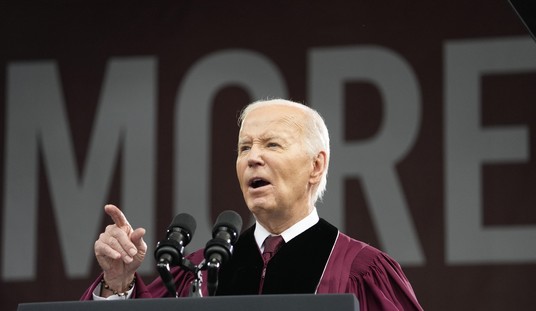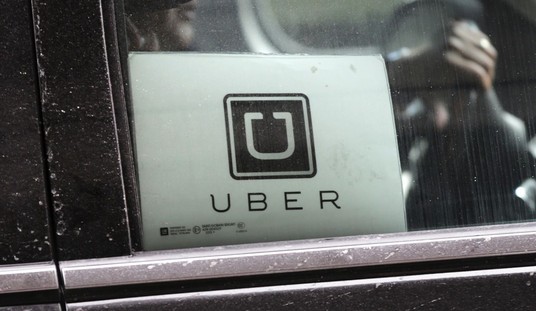Just where does Mark Zuckerberg plan on speaking publicly? He’ll probably choose his own Facebook platform, where fifty million or so of his customers might have a few pointed questions. Members of Congress want him and COO Sheryl Sandberg to come to Capitol Hill for some public speaking, too. For now, Zuckerberg wants to respond sometime over the next 24 hours to the Cambridge Analytica scandal, likely in hopes of containing the damage:
Facebook CEO Mark Zuckerberg will speak publicly in the next 24 hours with a “focus on rebuilding trust,” a spokesperson for the company told NBC News. …
Facebook has been under particular pressure to explain why the company did not notify users or the public that its data been used in a way that violated its terms of service. Facebook said on Friday that the company learned of the violation in 2015.
The lack of any public statement or appearance by Zuckerberg or Sheryl Sandberg, the chief operating office of Facebook, had led to growing questions about the company’s response to the ongoing crisis. The hashtag “#WheresZuck” began to circulate on Twitter.
The hashtag likely had less to do with Zuckerberg’s planned statement than the beating his stock took on Wall Street since the scandal erupted. As of midday yesterday, Facebook had lost 10% of its market capitalization value, losing the equivalent of a Ford Motors:
Shares of Facebook fell another 3% Tuesday on the heels of the company’s worst day in four years. $49.4 billion has been wiped off Facebook’s market value this week. …
Facebook has become one of America’s most valuable companies, with a market cap of around $488 billion. Its $49.4 billion loss in market value this week is larger than the market valuation of Ford, eBay or Delta.
Lawmakers in both the United States and UK are calling for founder and CEO Mark Zuckerberg to testify about the compromised data and Facebook’s policies to protect user privacy.
Zuckerberg holds around 400 million shares of Facebook. The value of his stake has lost $6.8 billion since Friday’s market close.
Losing nearly $7 billion would make me want to talk, too. However, Zuckerberg might be limited in what he can say, thanks to a class-action lawsuit filed late last night. A shareholder lawsuit preceded it by a few hours:
The proposed class-action complaint filed late Tuesday night by Lauren Price, a Maryland resident, is the first of what could be many lawsuits seeking damages over Facebook’s ability to protect user data, and Cambridge Analytica’s exploitation of that data to benefit President Donald Trump’s 2016 campaign.
“Every Facebook user has an interest in this lawsuit, and the enforcement of their privacy rights,” John Yanchunis, a lawyer for Price, said in a phone interview on Wednesday.
The complaint was filed in the U.S. District Court in San Jose, California, several hours after Facebook was blamed in a shareholder lawsuit filed in nearby San Francisco for the drop in its stock price after the data harvesting was revealed. Nearly $50 billion of market value was wiped out in two days.
Shareholders might have a legitimate beef, considering the beating they’ve taken, but a class-action lawsuit on behalf of users? Facebook is a free platform for users, and they’re not required to post any data on the platform at all. How do they establish a loss when the relationship is both free and voluntary?
In fact, that’s the point that most seem to be missing in this “scandal,” as I write in my column at The Week. People are expressing shock, shock over the clear design and intent of Facebook’s business model, which is to sell data — and furthermore, anyone paying attention would know that what Cambridge Analytica did was not at all unusual:
Facebook remains one of the most valuable companies in the world. Where, we might ask, is that value derived? After all, its 1.4 billion daily active users pay nothing for access to the platform, no matter how much they use it. It’s free from top to bottom. The money comes from ads. And Facebook’s entire advantage in selling ads is that because its user base is so big, it can promise advertisers the ability to target virtually any demographic group it wishes. (Want millennial homeowners in Kansas? Facebook surely has them. Retirees in Japan? It has them, too.) …
The data is available to third parties, too. In 2007, Zuckerberg opened the Facebook platform to outside developers, who would then write their own applications to interact with users and gain access to their data on a wide scale. And thanks to the network power of friending, these outside parties can sometimes get data not just on those who use the applications, but also on their friends, too. That’s a powerful force multiplier that’s built into the Facebook structure. This is how Cambridge Analytica leveraged 272,000 app users into an entrée to access the personal data of 50 million of their friends.
Cambridge Analytica wasn’t the first political operation to discover this capability, nor the first to have been known to take advantage of it. As The Washington Post reports, Barack Obama’s campaign made use of the same mechanisms to build its formidable social-media organization. The New York Timesreported in 2013 that Team Obama’s activities in data mining triggered alarms at Facebook, but that they shrugged it off. “They’d sigh and say, ‘You can do this as long as you stop doing it on Nov. 7,'” one campaign worker said. That effort was no less creepy and intrusive, either. “We asked to see photos but really we were looking for who were tagged in photos with you,” the same campaign worker told the Times, “which was a really great way to dredge up old college friends — and ex-girlfriends.”
In 2007, when Zuckerberg opened the Facebook platform to outside developers, it had 24 million monthly users. That number exploded along with the developers who created content for them. That model is hardly a secret, nor is it unique to Facebook:
The key point is this: When the service is free, you’re not the customer. You’re the product. If you don’t want to be the product, don’t sign up in the first place, or short of that, don’t load a bunch of personal data in the expectations that it will be kept private.
Shareholders who didn’t understand the business model employed by their investment have few moral grounds for complaint, anyway, even if they might have legal grounds. The same is true for the users who find themselves shocked that the data they gave Facebook for free turned out to be how they made oodles of money for themselves. And for that matter, it’s also true for the media outlets shrieking hysterically about Cambridge Analytica’s data mining when they’re hardly the only political operation to take advantage of the platform, too.
So what will Zuckerberg say? Perhaps he’ll announce the launch of a new Captain Louis Renault app, for those who find themselves shocked at being the product in Facebook’s business model … or Google’s … or …








Join the conversation as a VIP Member